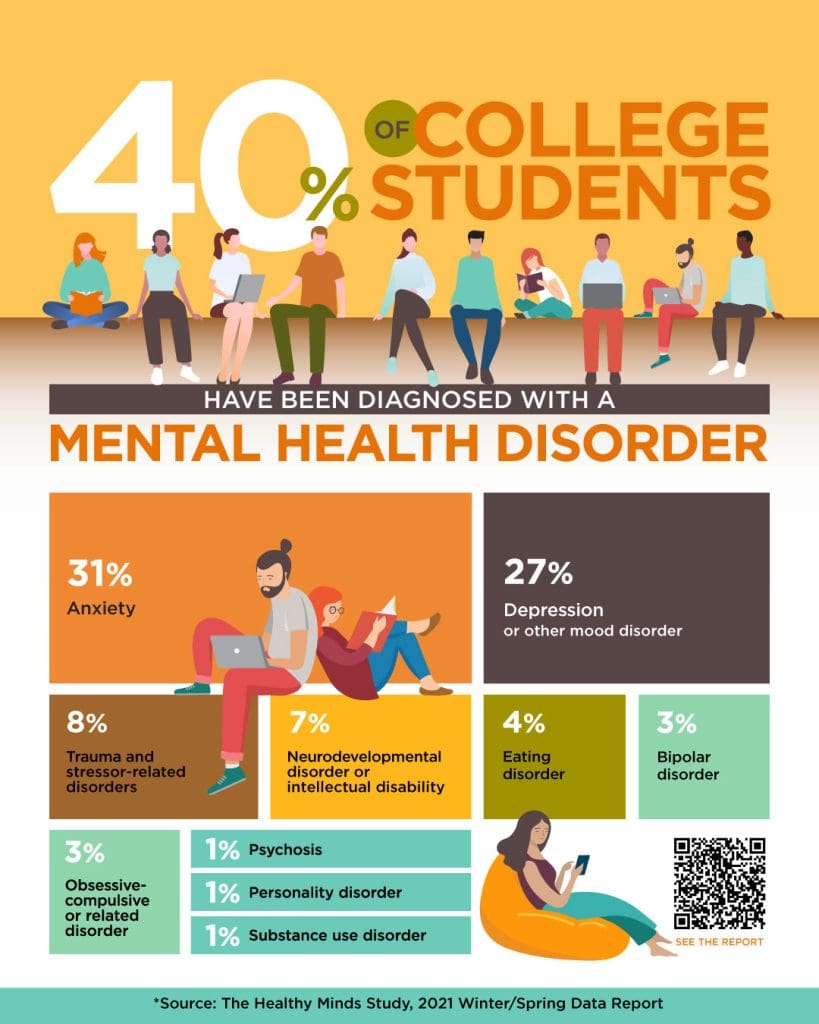Ready To Launch? Preparing Teens With Mental Health Issues for College
Teenagers getting ready for college need to deal with many new responsibilities. Managing a full courseload, moving into a dorm room, and meeting new people can be stressful for any student. On top of that, teens need to be solely responsible for meeting basic needs, from preparing healthy meals to doing laundry. This can be stressful too, especially for those with mental health issues.
A recent Healthy Minds Study shared just how much college students can struggle. Among the findings:
- 40% of students reported having been diagnosed with a mental health disorder.
- 41% had dealt with depression in the past two weeks, according to their responses to a patient health questionnaire.
- 34% had dealt with anxiety in the past two weeks, according to their responses to a screening tool.
To better understand common mental health challenges facing college students and how you can set your teen up for success, we spoke with Katherine Atherton, a mental health therapist with Optimum Performance Institute (OPI), a young adult transitional living program in California.
Table of contents

Common Mental Health Challenges Facing College Students
“A major life challenge, like entering a new school, can exacerbate a mental health condition or possibly even create one, like depression or anxiety,” Atherton said. “The inherent loss of connectedness and familiarity a teen once had can be overwhelming.”
This sudden shift into a new environment can be particularly difficult for students already dealing with conditions such as borderline personality disorder or suicidal ideation.*
Common mental health challenges for teens entering college include:
- Managing medication: Where before you may have reminded your teen to take their medication and refilled their prescriptions, college students need to keep track of such tasks themselves. Not keeping up with their meds can exacerbate existing conditions and introduce new problems.
- Continuing or seeking therapy: Teens who were already in therapy prior to college will need to continue their sessions, which may require switching to online therapy or finding a new therapist if their school is located far from their provider. Likewise, students who were not receiving therapy at the time they left for college but need it after starting classes must know where they can seek help and counseling.
- Avoiding substance abuse: Atherton noted teens on their own may be presented with drugs and alcohol in college and must know how to resist abusing substances. This is especially important for students who already had substance use or abuse issues.
- Forming or further solidifying their identity: College is a time for young adults to further develop who they are as people. This can include exploring aspects of their cultural, religious, and gender identity. Questioning who they are and their relationship to others can be confusing and stressful.
- Dealing with social issues: Meeting new people and making friends is a big part of college life. However, some students struggle to engage with others and self-isolate, leading to or intensifying mental or emotional problems.
- Having a sense of personal safety: Knowing how to stay safe on campus and at college parties can be a source of stress for new college students.
Knowing When College Is Right for Your Teen
With these challenges in mind, college may not be right for your teen. Mental health issues can make it difficult to have the best experience at a university. In addition, some teens may want to pursue a different form of education after high school (i.e., postsecondary education), such as a vocational or trade school.
If your teen needs a different postsecondary pathway than college, in addition to a vocational or trade school, consider the following options:
- Community college: Taking community college courses can be a good way for your teen to discover if college is right for them while remaining close to familiar surroundings and retaining your parental support.
- A gap year: Rather than transitioning directly into college after high school, your teen could spend a year working or volunteering and can adjust to more independent living before going to a university. The skills and habits they learn will help immensely if they later pursue a more ambitious educational plan.

Setting Your Teen Up for Success
If your teen does choose college, how can you set your teen up for success? Atherton offered several recommendations for steps you should take before your child’s first day of freshman year.
- Teach your teen life skills: From doing their own laundry and grocery shopping to cooking their own meals, teens should learn basic life skills so they don’t get overwhelmed by having too many new responsibilities. Atherton recommended parents start teaching their kids these skills at least six months before college, and ideally sooner.
- Develop their social skills: Encourage your teen to participate in clubs before and during college. This experience will help them practice social skills, avoid isolation, and build a support network.
- Research mental health resources and providers near college: Learn about the mental health resources provided by your teen’s school and supported by their health insurance plan. You and your teen should research the providers to learn who can help them the best.
- Create a crisis plan: Create a written crisis plan that includes information such as the location of nearby hospitals, hotline numbers like the 988 Suicide & Crisis Lifeline, and therapists who take your teen’s insurance. You and your child should keep copies of this crisis plan to make sure everyone is on the same page.
- Let your teen exercise responsibility: Preparing healthy meals, making appointments, and managing medications should all be tasks your teen performs on a regular basis before college. Again, plan to let them do this at least six months before college, and preferably sooner.
- Be a source of support: It’s always important you communicate that you’re there to provide a safe space for your child to voice concerns and share problems. This kind of connection will allow you and your teen to work together and achieve better mental wellness while they’re at college.
Above all, Atherton noted that you should not shy away from talking to your teen about mental health issues or your concerns about substance abuse and other unsafe practices. Stigma surrounding mental illnesses have kept such discussions from happening in the past for some families. Yet only by getting these difficult issues out in the open can you prepare your teen for college.
“It’s important for a young adult to know they can come to their parent if they’re struggling,” Atherton emphasized. “Always having that line of communication without the threat of disappointment is very important.”
Out-of-State Considerations
It’s important to note that if your teen plans to attend an out-of-state college, they’ll face a unique set of challenges. These students can’t easily return home for support if they experience a mental health crisis.
Atherton advised you and your teen examine the pros and cons of in-state and out-of-state colleges and come to a collaborative decision about the best choice. If your child needs more time to adjust to independent living, starting at a junior college or community college and then looking at out-of-state universities may be a better option.
Regardless of their choice, a young adult should always be mindful of their mental state.
“The young adult should know how comfortable they are with coming to their parents when they feel distressed — just having that space to be able to say, ‘Yeah, this isn’t working. I need to come home,’” Atherton said.
How Much Help Is Too Much?
As a parent, you naturally want to be there for your teen and support them as much as possible. However, if you spend too much time managing your child’s life, you can actually cause them to feel anxiety and stress.
To avoid this, Atherton advised you have your own person to talk to, such as a therapist. This person can provide mental health support and help you ask yourself important questions.
“Parents need to learn how to take a step back, take a deep breath, and regulate themselves — look at their behaviors and ask themselves, ‘Is this helping my child?’ Or is this causing more problems?’” Atherton said.
Learning how to regulate your emotions is a vital part of being a helpful parent since it helps you model proper behavior for your teen. When teenagers view their parents as reliable sources of support, they’ll be more likely to turn to them to talk about their problems and accept their advice.
One Final Piece of Advice
You can help prepare your teen for college by letting them take more responsibility for their choices, working with them to identify mental health resources, and developing a crisis plan — before they start this next stage of their life.
You can also consider finding a therapist to work through your concerns so you can not only regulate your emotions and behavior but also recognize your child’s maturity.
“The person leaving for college has survived life’s challenges this far. They are resilient,” Atherton said. “Ultimately, you have to trust that they’re going to make it through this next life challenge. All you really can do is help set them up and be a supportive presence for them.”
*This article is for informational purposes only and not to be considered medical advice. If your child is having a mental health emergency, contact the 988 Suicide & Crisis Lifeline for immediate support by calling, texting, or chatting 988. You can also text HOME to 741741 ─ the Crisis Text Line ─ from anywhere in the country to talk with a trained crisis counselor.
Embark is the most trusted name in teen and young adult mental health treatment. We’re driven to find the help your family needs. If you’re looking for support, contact us today!
